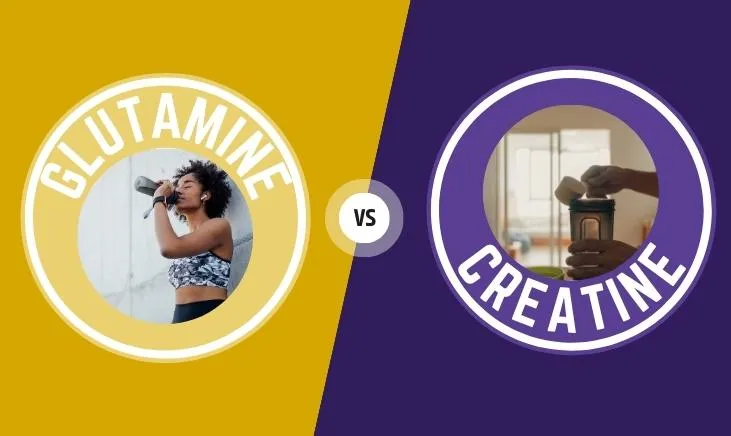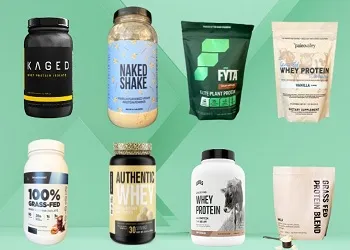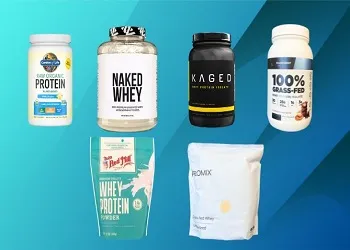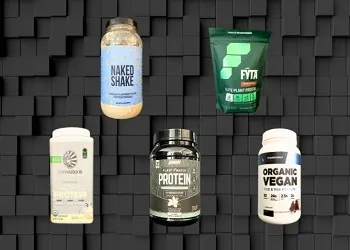Seeing athletes, bodybuilders, or even friends at the gym taking these supplements makes you wonder—what is glutamine? What is creatine? And should I be taking them?
A general understanding of these compounds, including the different types, pros and cons, and key differences, will help you make the most informed decision when choosing the right supplements for you.
Table of Contents
Creatine Overview

Creatine is an organic compound found mostly in our muscles where it plays an important role in energy production. It is considered the most effective supplement for building muscle and increasing performance by the International Society of Sports Nutrition.
Different Types of Creatine Supplements
You can take your daily creatine supplement in a few different ways. The most common is a powder that you mix with water, but you can also get creatine gummies or chews. Creatine is also commonly mixed with other supplements like pre-workout.
Creatine Monohydrate
Creatine monohydrate powder is the most well-studied form of creatine supplement. When creatine monohydrate is taken orally, ~99% ends up in tissue or urine through normal digestion.
Evidence shows that creatine monohydrate is the best choice for creatine supplementation.

Creatine Salts
Other forms of creatine have made their way to the market as alternatives to creatine monohydrate. However, there is currently insufficient evidence to suggest that they are any better than creatine monohydrate. Some of these creatine salts include:
- Creatine HCl
- Creatine Ethyl Ester
- Buffered Creatine
Benefits of Creatine
Creatine plays a very important role in energy production in your muscles. Our body uses adenosine triphosphate (ATP) to power our muscles. Creatine is involved in regenerating ATP. The more creatine you have, the longer you can delay muscle fatigue, allowing you to optimize your performance, resulting in:
- Increased muscle protein synthesis
- Faster muscle mass growth
- Optimized performance during high-intensity training
- Improved brain function

Potential Side Effects
The evidence shows that there are no serious negative health effects associated with taking creatine in the short or long term. However, you should consult your healthcare provider before starting new supplements, as the main reported side effect is water retention.
Glutamine Overview

Glutamine is a conditionally essential amino acid. Amino acids are the necessary materials for building proteins. Conditionally essential amino acids are those that our body can make under normal circumstances, but during times of stress or illness we cannot, so we need to consume them from our diet.
Of all the amino acids found in our muscles, glutamine is the most abundant amino acid, and just like other amino acids, it is involved in muscle protein synthesis. Glutamine is also fuel for cells in the immune system and helps to maintain homeostasis.
Different Types of Glutamine Compounds
You may have heard the term L-glutamine being used synonymously with glutamine. This is the form that we get through food or supplements, and some products will list the ingredients as L-glutamine, or simply glutamine.
Glutamine also exists in the form of D-glutamine. This is the same compound but with a different molecular shape. L-glutamine is the form that our body needs to build proteins.
Benefits of Glutamine
Glutamine has become increasingly popular as an exercise supplement because of its association with the potential benefits in:
- Increasing lean muscle mass
- Preventing muscle breakdown during muscle recovery
- Improved immune system
- Muscle glycogen resynthesis
- Weight loss
Glutamine is regularly given as a supplement to critically ill patients receiving nutrition support to ensure that they are meeting their nutrition needs as they recover. However, the research is still conflicting on the impact of glutamine as an athletic supplement in humans.
A recent meta-analysis found that while glutamine supplementation may affect weight loss, immune reactions, and blood glucose levels post-exercise, they found that there was not a strong association between glutamine supplementation and aerobic performance and body composition.

Potential Side Effects
Consuming amino acids in normal quantities will not cause adverse side effects, as these are naturally occurring compounds in our bodies. However, there is potential for them to cause harm when supplementing with large quantities. A study showed that when individuals were chronically consuming glutamine in excess (~40 g/day), there were negative impacts on the body’s metabolic systems.
Overall, if you’re consuming glutamine in smaller doses over short periods, you should be safe. However, additional research is needed to confirm the safety and potential side effects of long-term glutamine supplementation for athletic performance.
Glutamine vs Creatine: Key Differences

Creatine and glutamine are both produced in our bodies naturally and are required for major processes and functions. We can also ingest them both through animal protein foods. However, their roles are very distinct, and their credibility as a sports supplement varies greatly
Muscle Gain
While creatine isn’t directly involved in protein synthesis and muscle growth, it does have an impact on building lean muscle mass. This is because resistance training is a key factor in building muscle mass, and your muscles need energy to train. Creatine supplementation will increase the ratio of phosphocreatine to creatine in your muscles, allowing you to train longer and harder.
As an amino acid, glutamine is an essential compound for muscle growth and also participates in the synthesis of other amino acids. A positive balance of amino acids is required after resistance training for protein synthesis to occur, which is why many athletes choose to supplement with protein or amino acids to maintain this positive balance.
While there have been animal studies showing a direct relationship between glutamine supplements and increased protein synthesis, this same link has not been established in humans yet.

Exercise Performance
Creatine
Creatine is found in our skeletal muscles as phosphocreatine. Our muscles use phosphocreatine to regenerate ATP, which is the compound that provides energy to our muscles. This increased generation of ATP from increased creatine stores aids in high-intensity training regimens, endurance, and power.
A meta-analysis looking at the effects of creatine supplements on strength and power in athletes found that participants were able to lift 6.85 kg more for bench presses and 9.76kg more for squats when supplementing with creatine compared to the placebo group.
Glutamine
Glutamine’s effects on different markers of exercise performance are conflicting. Some studies have shown positive correlations between glutamine supplements and aerobic power, improving performance and oxygen consumption, while others have shown no effect. This is an area that requires a greater body of results before making any conclusions.
However, glutamine supplementation has been associated with weight loss, which could have potentially beneficial effects on exercise performance, depending on the activity. It also plays a role in maintaining hydration, which is key for exercise performance.

Muscle Soreness and Muscle Recovery
Creatine
The impact that creatine supplements have on muscle damage and recovery after exercise remains inconsistent. However, a recent meta-analysis and systematic review investigating this topic found that consuming creatine does help with muscle recovery because of its role in decreasing muscle damage indices.
Glutamine
There can be inflammation and soreness after exercise-induced muscle damage. Glutamine plays a role in decreasing this inflammation which can impact muscle soreness. This amino acid also participates in the process of glycogen synthesis in the muscles during recovery, which can help to prepare your muscles for the next workout.
Glutamine vs. Creatine: Pros and Cons
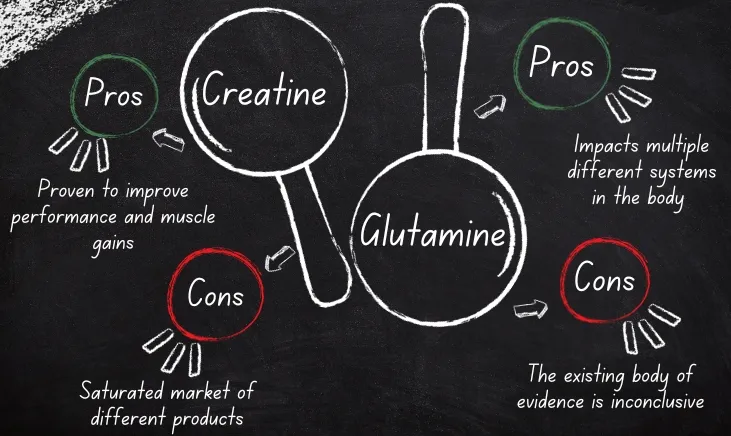
Pros and Cons of Glutamine
Pros: Glutamine plays a multitude of roles in the body, from protein synthesis to immunity to electrolyte control. All aspects of your health and metabolism are important to consider when you’re trying to maximize your muscle gains and overall performance, making L-glutamine supplementation a well-rounded choice.
Cons: Compared to other exercise supplements, glutamine is not well-researched. Therefore the results of supplementation are less conclusive and higher risk. While supplementation at low doses may be safe, you aren’t guaranteed positive outcomes in your training or body composition until there is more evidence to support it.
Pros and Cons of Creatine
Pros: Creatine is a very well-studied and reliable supplement that has been proven to improve athletic performance and muscle mass gains. If you’re looking for the biggest bang for your buck, then creatine is the way to go.
Cons: The market for creatine supplements is continuing to grow and diversify, bringing new and unique options for consuming your supplements. These include things like gummies, capsules, and flavored drinks which all contain a variety of artificial flavors, colors, and other additives and aren’t always third-party certified.
Choosing foods first when looking to meet your daily nutrition needs is usually the best choice, but we do know that sometimes that isn’t achievable, which is where supplements come in. So when you’re choosing a supplement, look for pure and third-party-tested ingredients.
Taking Glutamine and Creatine Together

A study investigating the effects on body composition from only glutamine supplements, only creatine supplements, and supplementing with both found a greater increase in lean body mass in all 3 supplementation groups compared to the placebo group. Whether this is due to the synergistic benefits of glutamine and creatine or a single compound remains unknown.
Should I Take Creatine and Glutamine?
Combining muscle-building supplements can be a way to ensure that you are covering all of your bases and maximizing your muscle synthesis. Since glutamine and creatine play different roles in metabolism and protein synthesis, taking both of them could potentially increase the overall positive effects.
Always read the ingredients and nutrition facts table on your supplements to ensure that you aren’t doubling up on any compound to not supplement in excess.
Glutamine Dosing
There is yet to be conclusive evidence on the best dosing regime for glutamine. Some products recommend 3g/day, while others recommend 5g/day. This range is in line with the dose used in studies assessing glutamine supplementation and body composition.
Creatine Dosing
There are different ways to approach creatine supplements. Some people choose to start with a creatine-loading phase where high doses are consumed multiple times per day to quickly build up creatine stores, followed by a maintenance phase where smaller doses are taken to maintain these creatine stores over time. According to the literature, a loading phase is not necessary to see the benefits of creatine supplementation.
- The loading dose is usually between 20-25g per day for 5-7 days.
- The maintenance dose is usually between 3-5g per day.
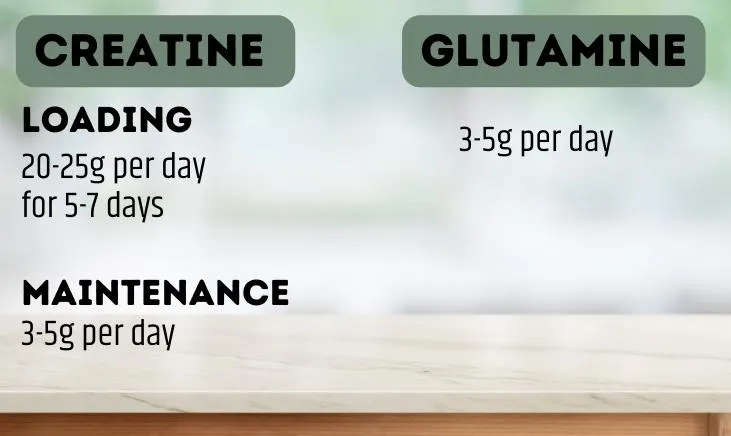
Creatine vs. Glutamine: Which Do We Recommend?
Considering all the research that has been completed, creatine is going to be the better choice over glutamine. Its role in increasing muscle mass and performance has been well studied for many years, its safety has been established, and there are many products available for sale that are credible and reliable.
Glutamine and Creatine Supplements
Our Recommended Glutamine – Thorne L-Glutamine Powder
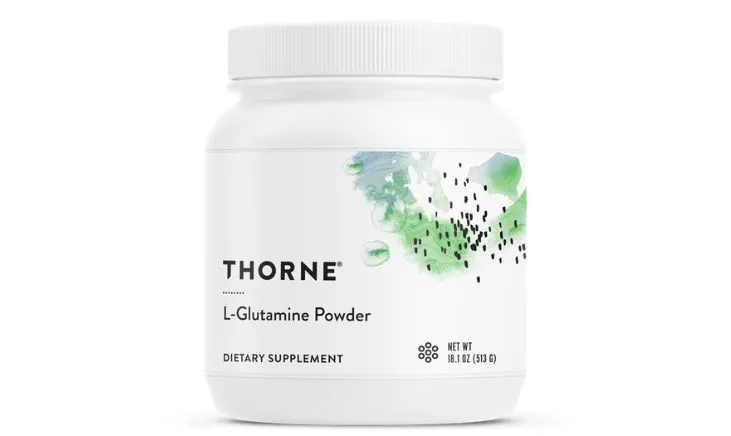
The best supplements are always those that are the safest and most reliable. That’s why we chose Thorne® L-Glutamine powder. It contains pure glutamine with no additives, is used by professional athletes, and is NSF Certified for Sport®, which is considered the best program to ensure safety for athletes by the USADA.
Our Recommended Creatine – Thorne Creatine
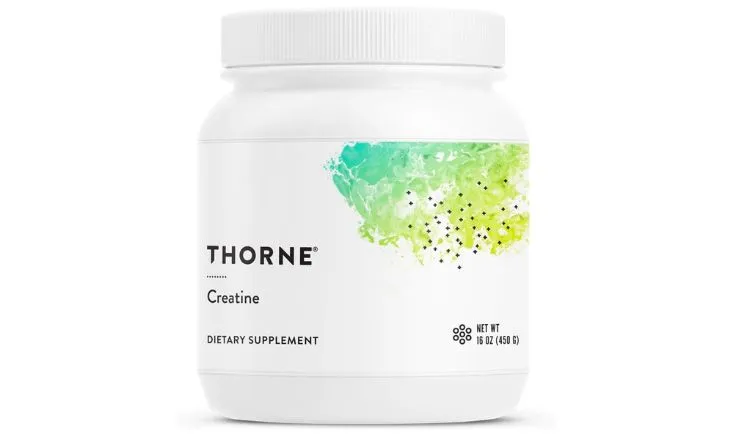
Thorne® also sells a creatine supplement powder, which is a great choice. It is in the form of creatine monohydrate, is NSF Certified for Sport®, costs only $0.08 per 1g of creatine, and contains no artificial colors or flavors.
For a more extensive overview of creatine products, check out our article on the Best Creatine Supplements on Amazon.
Frequently Asked Questions.
Which is better for muscle growth, L-glutamine or creatine?
Creatine has been proven to increase muscle gains when combined with resistance training. While L-glutamine is an essential part of muscle protein synthesis, its impact as an athletic supplement is yet to be confirmed, making creatine the winner.
Can you take glutamine, creatine, and protein together?
Many protein powders already contain creatine and glutamine. Take a look at your protein powder of choice and what the ingredients and amino acid profile are. It is safe to take creatine and protein powder together, but be careful about consuming too much glutamine each day.
Why do bodybuilders take glutamine?
Bodybuilders and other professional athletes consider all strategies to improve their performance and body composition, this includes nutritional supplements. They take glutamine because of its potential effects to prevent muscle breakdown and increase muscle growth.
Does L-glutamine reduce body fat?
There have been studies showing an association between L-glutamine supplementation and decreased fat mass, but it may be dose-dependent, which requires greater investigation. Glutamine can mediate fat metabolism, thereby decreasing overall fat stores in the body.
What not to mix glutamine with?
It’s important that you don’t consume too much glutamine, as the long-term effects of supplementation are still inconclusive, and there has been evidence suggesting that at doses higher than ~40g/day, there could be negative effects on your health. If you’re consuming other protein or amino acid supplements take a look at their amino acid profiles before adding additional glutamine to the mix.
